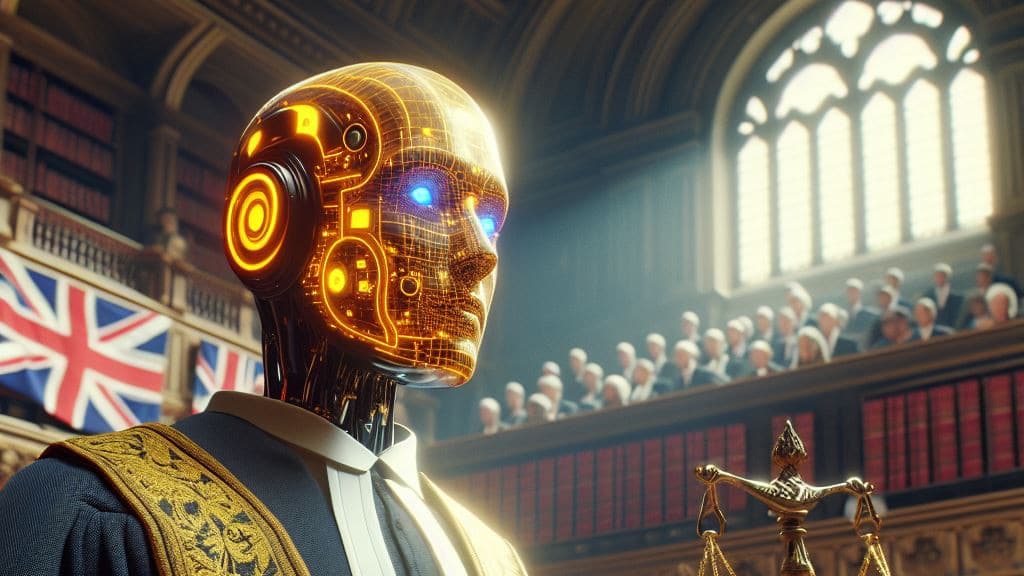The UK Supreme Court has declined to accept Stephen Thaler's appeal to patent AI as an 'Inventor'.
In Brief
In the UK, the Supreme Court has once again denied Stephen Thaler's request for AI to be regarded as the true holder of patents.

In a recent legal dispute, U.S. computer scientist Stephen Thaler encountered a significant hurdle as he sought to secure patent rights for inventions attributed to his AI. artificial intelligence (AI) system.
The heart of the case revolved around the possibility of recognizing artificial intelligence as the legitimate patent holder. Thaler's battle was over two patents produced by his AI known as Device for Autonomous Bootstrapping of Unified Sentience (DABUS), but he faced rejection from the United Kingdom's Intellectual Property Office.
This refusal was based on the premise that patent rights could only be assigned to humans or organizations, explicitly excluding machines from being considered inventors. Subsequently, Thaler took his case to the UK Supreme Court, which ultimately dismissed his appeal unanimously. patent rights The court made it clear that existing UK patent legislation mandates that an inventor must be a natural person.
As highlighted by David Kitchin, a judge on the court, in the official ruling noted by Reuters, 'This appeal does not engage with the wider issue of whether technological advancements produced by autonomous machines powered by AI should qualify for patent protection.'
'Nor does it address whether the term 'inventor' might need reevaluation to encompass AI systems capable of creating novel and non-obvious inventions with potential benefits over established products and processes,' Kitchin elaborated.
In the wake of the ruling, Thaler's legal team released a statement emphasizing that the decision underscores the limitations of current UK patent regulations when it comes to protecting inventions created independently by AI.
This unfortunate outcome in the UK reflects Thaler's previous defeat in the United States, where the Supreme Court chose not to entertain his challenge to the U.S. Patent and Trademark Office's denial of patents for inventions attributed to his system.
Thaler’s Ongoing Quest to Classify AI as a Patent Inventor AI system .
In a notable event from 2021, the Companies and Intellectual Property Commission in South Africa officially granted a patent for a food container that was designed using fractal geometry by Thaler's AI, DABUS.
The patent application, which was filed under the Patent Cooperation Treaty on September 17, 2019, marked a significant milestone by naming DABUS as the inventor of the food container. The application made it clear that the invention was generated independently by the AI.
Thaler's lawyer, Ryan Abbott, along with his team, has filed applications to register the computer as an inventor in at least 17 jurisdictions worldwide. They achieved favorable rulings in several places, such as the UK and Australia; however, the Australian patent office subsequently appealed the court's ruling.
In another setback in September 2021, U.S. District Court Judge Leonie Brinkema rejected an appeal and denied the patent, stating that, under U.S. law, only a human may be acknowledged as an inventor, and therefore, the answer to whether AI could hold such status was a resounding 'no.' South Africa Following today’s refusal by the UK court, it will be intriguing to observe how Thaler and his team plan to move forward. Their legal representatives pointed out the shortcomings of existing laws. This recent setback builds on previous failures in the U.S. and contributes to a broader international debate, despite a solitary success in South Africa. The trajectory of Thaler’s next actions is uncertain, adding layers to the ongoing conversation about AI and its relationship with intellectual property rights.
, please be aware that the information on this page is not intended to serve as legal, tax, investment, financial, or any other form of advice. It is vital to only invest what you can afford to lose and seek guidance from independent financial advisors if you have any uncertainties. For more information, we recommend consulting the terms and conditions along with the help and support sections provided by the issuer or advertiser. MetaversePost is dedicated to providing accurate and impartial reporting, although market conditions may change without notice.
Kumar serves as a seasoned technology journalist who specializes in the rapidly evolving intersections of AI, machine learning, marketing technologies, and new realms like cryptocurrencies, blockchain, and NFTs. With over three years of experience, Kumar has built a solid reputation for crafting engaging narratives, performing deep-dive interviews, and delivering insightful reports. His proficiency lies in producing high-quality content, including articles and research publications for widely recognized industry platforms. With a unique blend of technical knowledge and storytelling finesse, Kumar excels at translating intricate technological ideas into relatable concepts for varied audiences.
Disclaimer
In line with the Trust Project guidelines Cryptocurrencylistings.com Launches CandyDrop for Streamlined Crypto Acquisition and Enhanced User Interaction with Premier Projects







